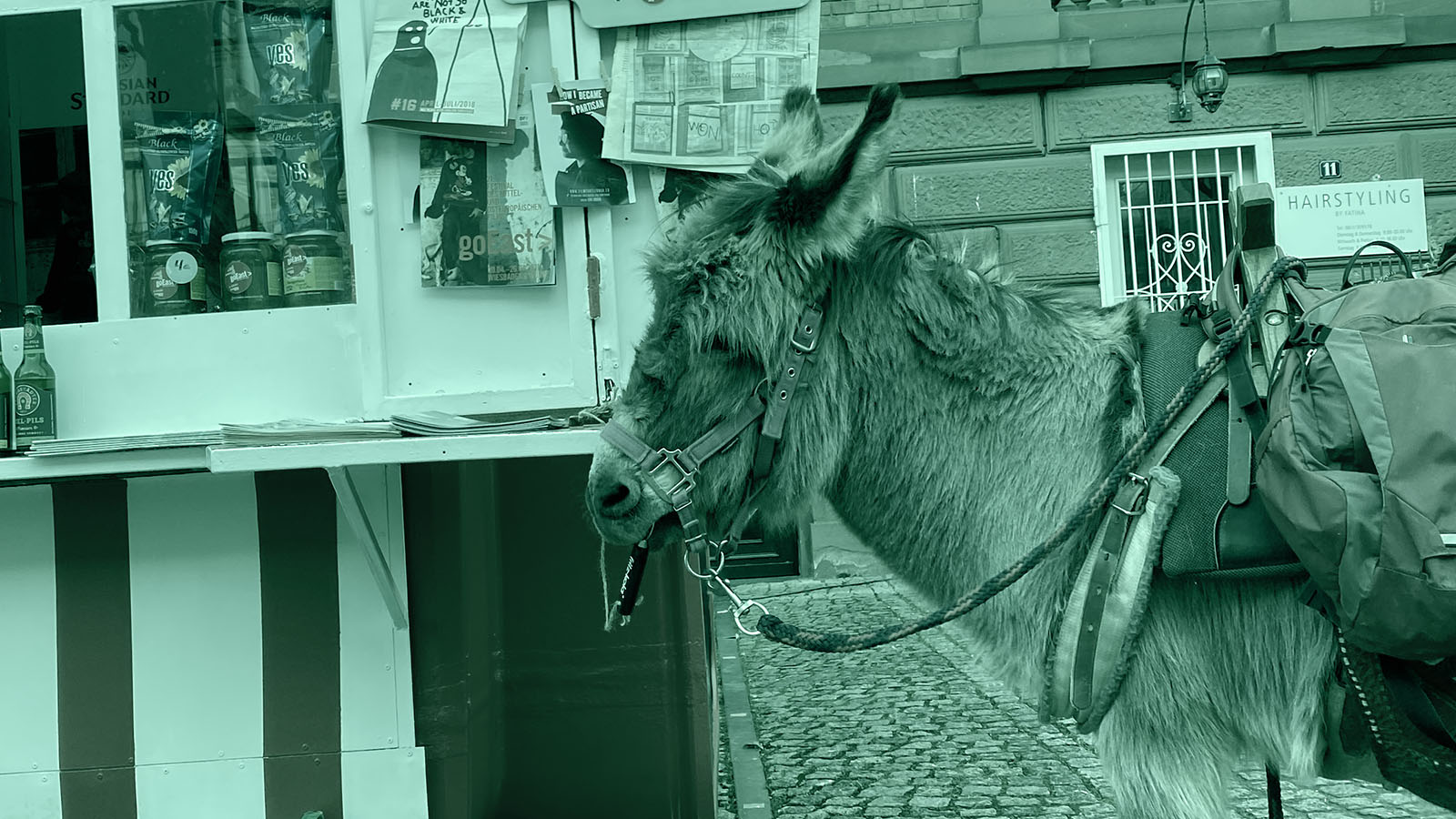
Events
For more information on tickets and venues click here.
For detailed information on the panels of the symposium check our programme booklet.
Exhibition
25×25
From April 15 to May 15, visitors to the Film Museum in the foyer of the DFF in Frankfurt will encounter 25 influential personalities of the Central and Eastern European film landscape. Filmmakers such as Agnieszka Holland, Kira Muratova, István Szabó and Radu Jude have been guests at goEast over the past 25 years. Despite international festival successes, the big names of Central and Eastern European cinema are often unknown to German audiences. The exhibition 25×25 presents pictures taken in Wiesbaden by goEast festival photographers, together with biographies and impressive filmographies. In addition, a multimedia installation, the so-called Cinecube, shows film excerpts from award-winning goEast films in a loop.
Wednesday, 23.04.
Caligari 18:30 ANNIVERSARY OPENING – 25 YEARS GOEAST
+ Concert CLEANING WOMEN, vodka reception
With silent film concert CHEMI BEBIA (MY GRANDMOTHER) GSSR 1929, D: Kote Mikaberidze
Tickets: 15 Euro
Here you can find the film.
Thursday, 24.04.
Altes Gericht, Clubhouse (G) 16:00
PANEL DISCUSSION: THE IMPACT OF MISSING IMAGES IN A VISUAL WORLD
With:
- Chingis Azydov – External researcher at the Commission Canishing Languages and Cultural Heritage, Austrian Academy of Sciences
- Lisabona Rahman – Filmarchivist, curator, film scholar, Berlin/Jakarta
- Dr. Fabian Schmidt – Film scholar, Film University Babelsberg KONRAD WOLF (DFG long-term project „Images with Consequences – An Archaeology of Iconic Film Footage from the Nazi Era“)
- Barbara Wurm – Slavicist, Head of Berlinale FORUM
Moderation: Heleen Gerritsen, Wiesbaden – Head of Festival goEast Filmfestival
Admission free
CLUBHOUSE opening hours 16:00-23:30.
Friday, 25.04.
Altes Gericht, Civilkammersaal (1F) 09:30 – 10:30
LECTURE: The Promise of the Golden Years: Selling Age and Gender in European Cinema
With: Vinzenz Hediger (Switzerland/Germany)
Moderation: Gloria Dagnino (Italy/Switzerland)
Admission free
Altes Gericht, Clubhouse (G) 14:00-16:00
100 Years FIPRESCI + Masterclass with Dunja Bialas and Claudia Dillmann
Admission free, registration by mail to: goEast-info@dff.film
Schlachthof, Kesselhaus 22:00
UKRAINIAN BEATS @Schlachthof
Party with ukrainian live music by Naina Doroshenko and DUDUNIA as well as sounds by goEast resident DJ Janeck
Tickets are available at the box office in the Schlachthof for €10 or by showing your accreditation.
Altes Gericht, Civilkammersaal (1F) 11:00 – 12:45
PANEL DISCUSSION: Can Women Age in Eastern European Cinema?
With: Matthijs Wouter Knol (Netherlands/Germany), Elene Naveriani (Georgia/Switzerland), Ada Solomon (Romania), Labina Mitevska (North Macedonia)
Moderation: Asja Makarević (Bosnia and Herzegovina/Germany)
Admission free
Caligari 18:30
THE ECLIPSE (FORMØRKELSEN) NOR 2022, R: Nataša Urban
Followed by a talk with Nataša Urban and the Yugoretten (Mateja Meded & Boris Hadžija)
Tickets are available here.
CLUBHOUSE opening hours: 16:00-23:30
Saturday, 26.04.
Altes Gericht, Civilkammersaal (1F) 09:30 – 11:15
Vortrag + Diskussion: Perspectives of Gerontology
With: Miranda Leontowitsch (Germany), Helma Lutz (Germany), Anna Wanka (Austria/Germany)
Moderation: Boglárka Angéla Farkas (Romania)
Respondent: Francesco Pitassio (Italy)
Admission free
Altes Gericht, Clubhouse (G) 14:30
YUGORETTEN PANEL: “UNDER THE SUN”
Boris Hadžija und Mateja Meded talk to Jasmila Žbanić, Asja Makarević and Nataša Urban
Admission free
Altes Gericht, Eventspace (basement) 22:00
goEast Birthday Party @Altes Gericht
With DJ Vika! und DJ Janeck
Admission by Donation
Altes Gericht, Civilkammersaal (1F) 11:45 – 13:15
Vortrag + Diskussion: Systemic Care and Ageing
With: Tony Tracy (Ireland), Eszter Ureczky (Hungary), Boglárka Angéla Farkas (Romania), Asja Makarević (Bosnia and Herzegovina /Germany)
Moderation: Vinzenz Hediger (Switzerland/Germany)
Admission free
Caligari 15:30
ROSA LUXEMBURG (CSK, BRD 1986, R: Margarethe von Trotta)
followed by a talk with Margarethe von Trotta and Urs Spörri
Tickets are available here.
CLUBHOUSE opening hours 16:00-20:00.
Sunday, 27.04.
Altes Gericht, Civilkammersaal (1F) 09:30 – 11:30
Lecture + Discussion: Fragility, Gender and Agency
With: Estella Tincknell (United Kingdom), Andrea Virginás (Romania), Adrien Valgalier (France)
Moderation: Eszter Ureczky (Hungary)
Respondent: Belén Vidal (United Kingdom/Spain)
Admission free
Altes Gericht, Civilkammersaal (1F) 12:00 – 13:30
PANELDISCUSSION: Female Ageing and Film Curation
Mit: Heleen Gerritsen (Netherlands/Germany), Asja Makarević (Bosnia and Herzegovina /Germany), Boglárka Angéla Farkas (Romania), Andrea Virginás (Romania)
Admission free
Murnau 15:00
Werkstattgespräch (Recorded Conversation): At Home with Anastasia Lapsui und Markku Lehmuskallio
Presented by Olaf Möller
Admission free
Caligari 11:00
Matinee SUZY SAXOPHONE (SAXOPHON SUSY) DEU 1928, R: Karel Lamač
with musical accompaniment by Uwe Oberg & Ulrike Schwarz
Tickets are available here.
Caligari 15:00
TIMESTAMP (STRICHKA CHASU) UKR, LUX, NLD, FRA 2025, R: Kateryna Gornostai
followed by a talk with Natalia Libet and Heleen Gerritsen
Tickets are available here
CLUBHOUSE opening hours: 16:00-23:30.
Monday, 28.04.
Altes Gericht, Schwurgerichtsaal (1F) 10:00
East-West Talent Lab – Project Market Pitch
Admission free
CLUBHOUSE opening hours: 16:00-23:30.
Tuesday, 29.04.
Caligari 19:00
Award Ceremony 25th goEast – Festival of Central and Eastern European Film
